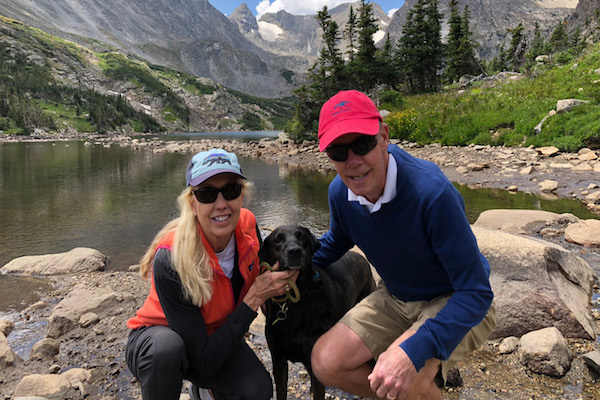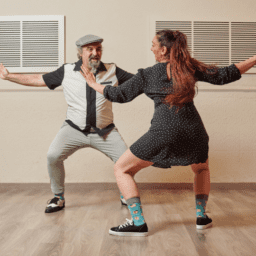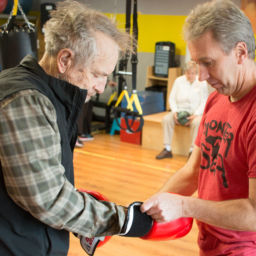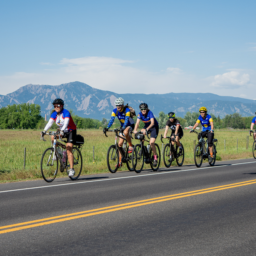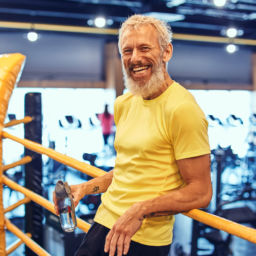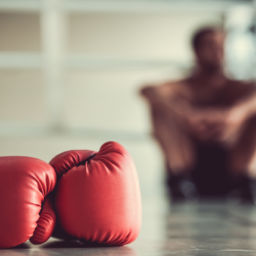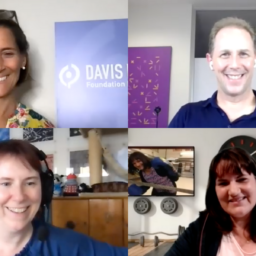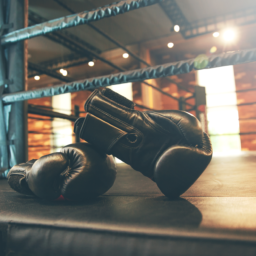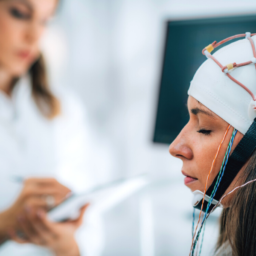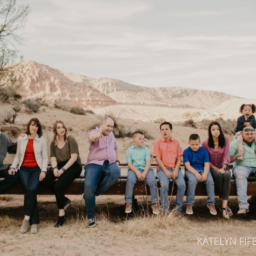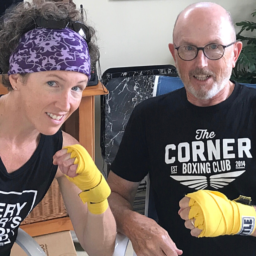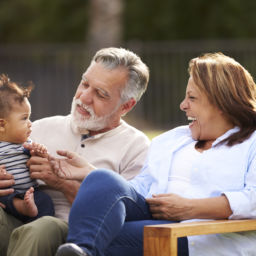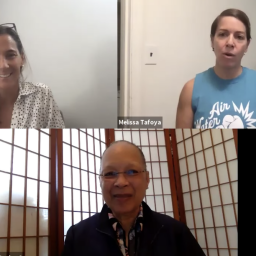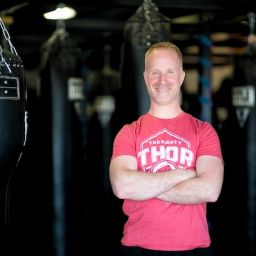Bill and Coe London are the kind of people everyone loves to be around. No matter where they go, they bring their positive attitude and joy for life (and their dog, Lily) with them, and it rubs off on the people with whom they interact in a thousand different ways.
In honor of Parkinson’s care partner month, we sat down with Coe to learn what life is like as Bill’s wife and primary Parkinson’s care partner.
How long has Bill been living with Parkinson’s?
Bill was diagnosed three years ago. However, like many people with Parkinson’s, he was in denial for a long time. I knew he had Parkinson’s two years before his diagnosis, and looking back I saw symptoms as long as 10 years before diagnosis. We rode and showed performance horses for a hobby and both the trainer and I noticed the drastic inconsistencies in his rides. Eventually, balance became a huge issue on the horse for him.
What was it like when he was first diagnosed?
Actually, I felt relieved when Bill was diagnosed because he no longer had to spend all that energy hiding it. Neither of us knew much about Parkinson’s, but we were eager to learn and read every book we could find. We also talked to a number of physicians who had become friends over the years, and we contacted the Davis Phinney Foundation.
Bill embraced his diagnosis 150%. A month or so before his diagnosis, we saw the 60 Minutes segment by Leslie Stahl and her husband on Rock Steady Boxing. A longtime fan of boxing, Bill could not wait to start boxing. Not only did he start, but he recruited anyone he knew with Parkinson’s to the classes—and if people were unable to drive, he picked them up and took them to class.
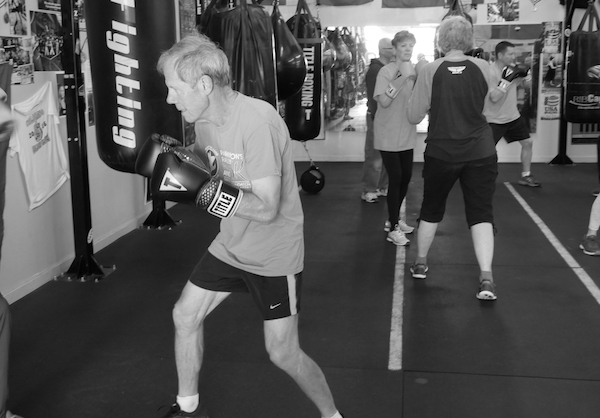
What is your philosophy as a care partner?
Stay flexible. Always be compassionate. Provide support but don’t rob them of doing things themselves. Stay positive as much as possible. Be open to new connections and new friendships. See the silver linings. Don’t try to predict how things will be tomorrow, a month from now, a year from now. Go to every doctor’s visit. Make suggestions but let your person with Parkinson’s decide. Know that the hard days will likely be followed by better days. Live only in the present moment. Everything is temporary. And, above all, remember that patience is a virtue.
What have been the biggest challenges you’ve faced since Bill’s diagnosis either individually or as a couple?
Stress from Bill’s work made his Parkinson’s symptoms much worse. So, Parkinson’s brought on retirement a lot sooner than we anticipated. One of the first things we did was close his office. That was a huge physical and emotional task.
Retirement forced us to look closer at our lifestyle and our expenditures. After the office closure, we decided to sell our house and move to one much smaller with just one story. We had lived in our house for 25 years and bought it from Bill’s grandparents; so, Bill was very attached to that house. Like the office, it was a very difficult move both physically and emotionally.
Horses had also been a big part of our and our children’s lives for over 25 years. Riding and showing are just two aspects of the experience. These horses became part of our family. At the same time, there’s a great cost in keeping horses when it comes to money, energy, time, etc. Bill’s health had to come first, so it became clear early on that we couldn’t continue with the horses. We not only said goodbye to the horses but all the friendships we made with others in that community. In truth, leaving the horses was probably a bigger adjustment for me than it was for Bill.
In addition to Bill’s retirement from work, I also retired from my freelance portrait photography business. It just didn’t fit around my new role as a care partner and all the lifestyle changes we had to make.
Socially things changed, too. Dining out at loud restaurants or going to parties are just not compatible with Parkinson’s. In addition, you can see how some people/friends are very uncomfortable around Parkinson’s. Eventually, we started to gravitate to more low key social situations and supportive, understanding friends. These days we have many more small dinner parties at home, and we both love that.
Running and racing had also been a huge part of Bill’s life. He trained for and ran 38 marathons in 19 years, and he was a volunteer coach for cross country and track when his three children were in high school. Today he still manages to walk a mile out and then run back, but it’s nothing like it used to be. He also boxes four times a week which comes with a good workout and a huge social and support network.
There are all kinds of loss in the aging process, but Parkinson’s sped up that process tenfold. Therein lies the challenge—how do you choose to deal with loss?
Being grateful for the time we did get to spend in our careers, in our house and with the horses is healing for me. As is finding new activities. Parkinson’s makes you simplify your life. It makes you realize what is important and who is important in the journey.
Secondly, I believe my/our challenges are manageable, and I’m constantly inspired by Bill’s tenacity and spirit. That makes it a lot easier.
What do you do to take care of yourself?
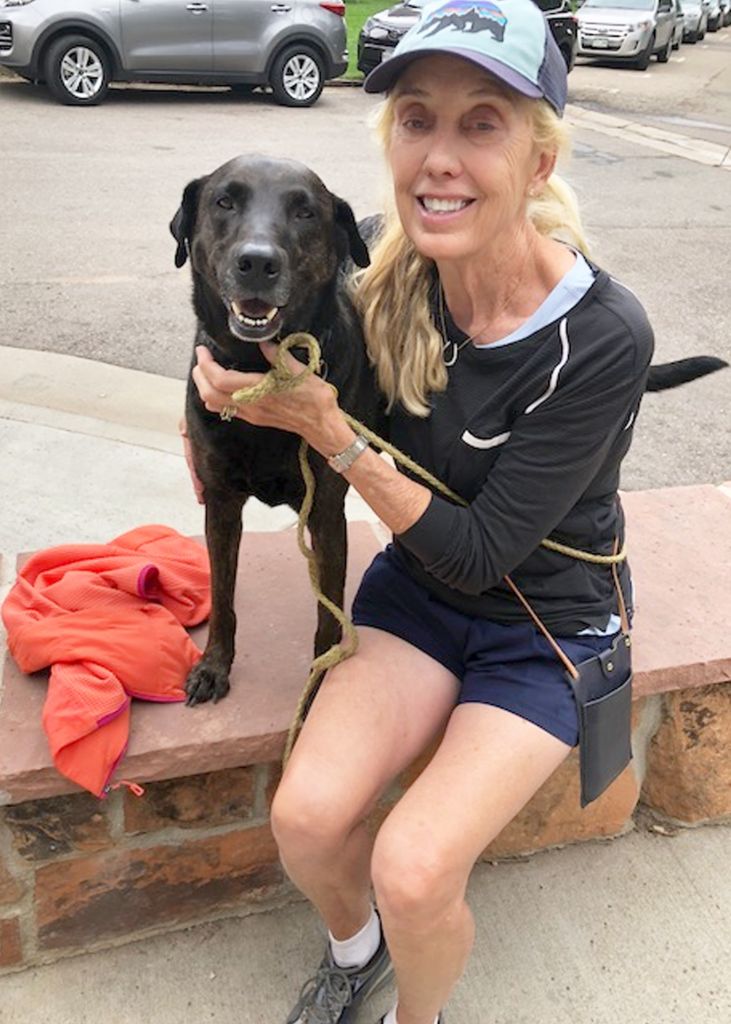 Along with Bill, I have always been physically active. My activity has become even more important since Bill’s diagnosis. I walk with my dog anywhere from five to ten miles a day. Being outside really restores my soul and our dog, Lily, has provided enormous unconditional love and support through this entire journey. She has also filled a wide gap that the horses left. I enjoy doing dog training with her once a week. In addition, I attend Barre3 classes (a combination of yoga, pilates and ballet) four to five times a week. I find the classes not only give me the strength and conditioning I need to remain active, but they’ve given me wonderful, new, supportive friendships.
Along with Bill, I have always been physically active. My activity has become even more important since Bill’s diagnosis. I walk with my dog anywhere from five to ten miles a day. Being outside really restores my soul and our dog, Lily, has provided enormous unconditional love and support through this entire journey. She has also filled a wide gap that the horses left. I enjoy doing dog training with her once a week. In addition, I attend Barre3 classes (a combination of yoga, pilates and ballet) four to five times a week. I find the classes not only give me the strength and conditioning I need to remain active, but they’ve given me wonderful, new, supportive friendships.
I see a therapist once a month and go more often if I need it. I find a professional person can give me new ways of seeing things and offer suggestions on how to handle difficult situations. Parkinson’s support groups are also important. It may take a little bit of trial and error to find the right fit, but it’s worth it.
Before Parkinson’s, I always took trips that had a challenge in them—competing in a horse show, going on an Outward Bound adventure or going to a photography workshop. Since the onset of Bill’s Parkinson’s, I seek out more restorative vacations, especially since my time away is more limited. These days I’d rather meet a small group of close friends in Colorado and have no agenda.
Meditation has been helpful as well. I wish I could be more consistent, but I do notice that when I practice, I generally handle things better. Pema Chodron is my choice in meditation teachers. She is excellent in the area of pain and suffering in addition to living well.
I will also say that when I was initially dealing with Parkinson’s and all the changes it brought to our lives, it had a negative/draining effect on my immune system. I developed chronic sinus infections which no antibiotic could remedy. After some research, I found a homeopathic doctor in Boulder whose program finally turned around a chronic health problem for me.
What have been the most surprising lessons you’ve learned during this journey?
In terms of Parkinson’s itself, I was surprised to learn how the symptoms and progression of it vary from person to person. I was surprised to learn that symptoms can vary tremendously day to day. I was surprised to learn how much Parkinson’s effects cognition. Most of all, I was surprised to learn how little we know about Parkinson’s. We have no cure because we don’t know the cause. It’s a mystery.
I am both intrigued and surprised by how effective boxing is in alleviating Parkinson’s symptoms both in the short and long-term. Some report that they actually reverse symptoms while others report a slowing of the progression of the disease.
I am pleasantly surprised by how much exercise—whether you box, cycle, walk, dance, practice yoga—positively affects symptoms of Parkinson’s. It makes me wonder: do athletes do better than non-athletes with Parkinson’s?
As a very generous fundraiser/donor to the Davis Phinney Foundation, what do you think has made you so successful?
I have had some experience in the fundraising world, so that helps tremendously. I know that people give to people so I focus on telling stories. Each and every person with Parkinson’s has a compelling story to tell; so, if you can tell your story and connect with your friends over the years, it makes fundraising a lot easier.
One of the keys is to make giving easy and then never waiver when it comes to reaching your goal. Help is out there if you need it, too.
Finally, our best fundraising successes have come when we have found a person or institution to match what we raise. Everyone loves to give to a challenge!!
How do the people and programs offered by the Davis Phinney Foundation impact you and help you live well as a Parkinson’s care partner?
We learned about the Davis Phinney Foundation early on. We went to the office seeking a local boxing gym in Boulder and learned so much more that the Foundation had to offer! (And, by the way, The Corner Boxing Club is the most uplifting, caring experience you will ever find in a gym.)
Secondly, we got to attend The Victory Summit® event, which along with the Every Victory Counts® manual is so inspiring. The resources the Foundation provides are simply incredible. And, it has been so rewarding to put people who have been newly diagnosed with Parkinson’s in touch with all of you.

In working on a fundraising event for the Foundation, I became acquainted with so many of the staff in the office. Each and every one of them is doing such a good job, making such a difference in the quality of life for so many. Just knowing that they would help me connect with the right person/institution for any Parkinson’s issue is a tremendous comfort and relief to me as care partner.
The blogs and other people’s stories on the website always provide new insights, new ideas and new ways of thinking about different issues.
There are so many worthy causes out there and so many Parkinson’s organizations. What is it about the Davis Phinney Foundation that stands out?
The people, the mission and staying on track with that mission.
While waiting for a cure for Parkinson’s, which will probably not happen in our lifetime, the mission and focus of the Foundation of making lives better for people living with Parkinson’s now are monumental.
What are you most excited about in 2019?
I am excited about becoming an Ambassador for the Foundation and spreading the word about living well with Parkinson’s. I’m also excited about Bill participating in the Founder’s Fights put on by The Corner Boxing Club in May of 2019. I’m excited that he’s challenging himself once again to participate in the fights and working towards that goal. And, I am excited to raise even more money for the Foundation. Last year we raised over $19,000 and I am hoping we can top that!!! The challenge is on!!!
Ready to Make Change Happen?
If you’d like to help the Davis Phinney Foundation make sure even more people living with Parkinson’s get the tools and resources they need to live well in 2019, donate here.


